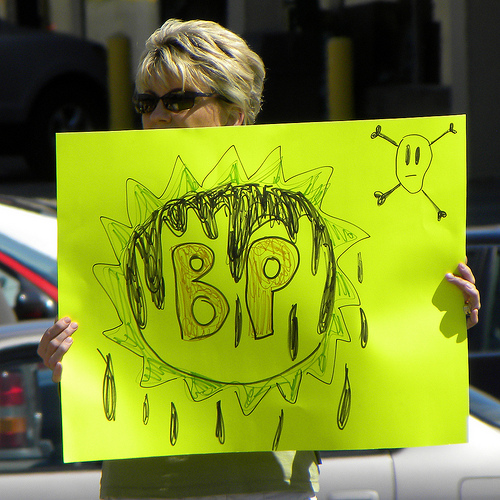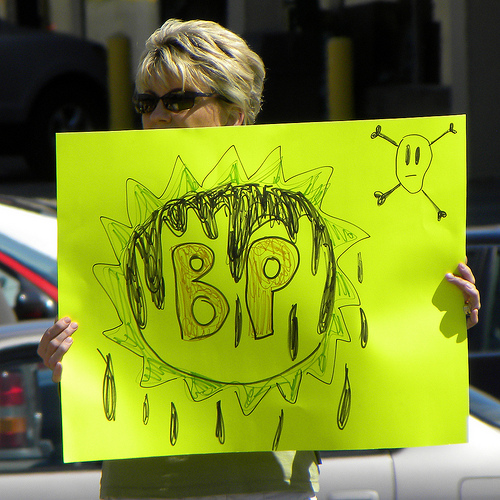Send your question to Umbra!
Q. Dear Umbra,
This oil spill has really gotten me down. Countless millions of gallons flowing into the beautiful Gulf of Mexico and no end in sight. The leak just keeps on leaking. I hate to admit this, but I’m feeling helpless and a bit hopeless. I’m not a big oil company or the U.S. government. I’m just one person. What can I do to help? Show me the silver lining in the oil slick.
Slick sick,
Umbra
A. Dearest Umbra,
It’s great to hear from you. Even though you are just one person (who occasionally writes letters to herself — which is like being two people … ), there are concrete things you can do to make a difference. And there’s reason to hope. (Please see No. 8 below. I like to save the best, most hopeful stuff for the end.)
 Way to help No. 4: Protest!Photo: Fibonacci Blue via FlickrHere are eight ways you can help with the oil spill.
Way to help No. 4: Protest!Photo: Fibonacci Blue via FlickrHere are eight ways you can help with the oil spill.
1. Donate. You give a darn, right? So why not give some money to a local organization working on the front lines. Here are several to consider. (They’re not the only ones out there, but they will get you started, if you are so inclined.)
- Our Gulf Waterkeepers
- Gulf Coast Fund for Community Renewal and Ecological Health
- National Wildlife Federation — you can easily donate $10 to support NWF’s oil spill cleanup efforts by texting “Wildlife” to 20222
- Gulf Restoration Network
2. Volunteer. There are many fine organizations in the Gulf of Mexico registering volunteers to help with the spill. Here are a few notables:
- The National Audubon Society is training volunteers to clean birds and other wildlife affected by the spill. They’ll also be relocating rescued birds. (A note to aspiring do-gooders: Don’t try to help a bird with your bare hands if you are not a trained rescuer; it could harm the bird and you. If you do find a creature in need, call BP’s oiled wildlife hotline: 866-557-1401.)
- eBird, an online birding resource that tracks the health and size of bird populations, is looking for volunteers to help survey Gulf Coast bird populations. Info collected by volunteers will help to prioritize and focus conservation efforts.
- LA Gulf Response
- Global Green’s New Orleans office
- United Way of South Mississippi
- Grassroots Mapping — even though satellite images are tracking the size and movement the oil spill, Grassroots Mapping is “helping citizens to use balloons, kites, and other simple and inexpensive tools to produce their own aerial imagery of the spill … documentation that will be essential for environmental and legal use in coming years.” Put your camera on a kite and take (maybe useful?) spill photos.
3. Gather. The Huffington Post and Meetup are helping people hook up with with others in their area who want to do something about the spill. There will be meetups around the country on World Oceans Day, which is Tuesday, June 8, 2010. Go here to find the meetup nearest you.
4. Protest. March. Make a statement in public. You can even coat yourself in chocolate sauce — it looks like oil, and it makes a powerful (and delicious!) statement. Here are some places to go to learn where, when, and with whom to protest:
- Act Against Oil
- Hands Across the Sand
- The Sierra Club’s “Clean It Up” events are not protests, but gatherings of people who want to make a collective statement.
- If you’re a loner and a rebel, you can don a costume, make a sign, and protest at your local BP gas station. Find the station nearest you.
5. Write. The power of the pen is still quite mighty.
- The Gulf Restoration Network has crafted a letter for you to send to your senators and representative, the Obama administration, and other elected officials. It urges the government to accurately assess and address the damage from the spill.
- Better yet, write your own letter.
You could also sign online petitions, though this veers into slacktivism territory:
6. Know your seafood. The Gulf of Mexico is one of the most productive fisheries in the world. In 2008, according to the U.S. Environmental Protection Agency, the gulf produced 73 percent of all U.S. shrimp and 59 percent of our oysters. Given that the contamination from this spill could affect the gulf’s productivity for years to come, here’s some seafood for thought: Learn more about fish you plan to eat — like is the species threatened or endangered — before you eat it. A good way to vet your ocean vittles is with the Monterey Bay Aquarium Seafood Guide. There’s even an app for that!
7. Become a star! Then you can fund research for oil clean up, like actor/director Kevin Costner. Who knew the Waterworld star is also a star of water? Since the Exxon Valdez spill in 1989, Costner and his scientist brother Dan have been developing an oil separation machine that, as Costner told The New York Times, is “prepared to go out and solve problems, not talk about them.”
OK, maybe becoming a celebrity it asking too much. But you can go out and solve problems instead of talking about them too.
8. Break your oil addiction. The first step is admitting you have a problem. There’s nothing like a catastrophic blunder to wake us up to that fact so that we can start to change our ways. This is an oil-dependency teachable moment. Because truly, the most important thing we can do is reduce our dependence on fossil fuels. I know, much easier said than done. But there’s no time like the present to get started. If this disaster doesn’t motivate us, what will? Here are a few steps each one of us could take:
- Take stock of your carbon footprint. Here’s how. Then, lighten your lifestyle.
- Get out of your car. Give the ol’ gas tank a break. Take the bus or the subway. Public transportation is the new SUV. And I mean that in a good way. Don’t forget bikes and your own two feet — biking or walking can make getting around town feel like a day in the park.
- Support alternative, sustainable energy sources like wind and solar power. If you can’t afford to install solar panels or a wind turbine at your place, check with your local utility company. Many power providers now make switching to cleaner energy sources an option on your bill. In New York, ConEdison lets its customers call or check a box on their bill to make the switch to renewables. See if your state and utility offer green energy options. If they do, then make the switch. It’s easy, and the more people who opt for renewable sources of energy, the more affordable and available these options will become.
In some areas of the country, competitors to your utility company offer 100 percent renewable energy options. In many cases, the energy you buy from these green providers costs less than energy generated by a nuclear or coal-fired power plant. See if your state has a competitive energy market and learn how to switch.
- Promote smarter transportation systems. Here are 10 great ideas. And here are 10 ways to help your town or city go greener.
So don’t despair, Umbra. These are just some of the ways we can pitch in to help clean up this Gulf oil spill and prevent others. I’m sure there are plenty more. If you, dear readers, have any ideas or suggestions, please share them in the comments below.
There’s a lot we can do. Now’s the time. Let’s make change together.
Silverliningly,
Umbra



